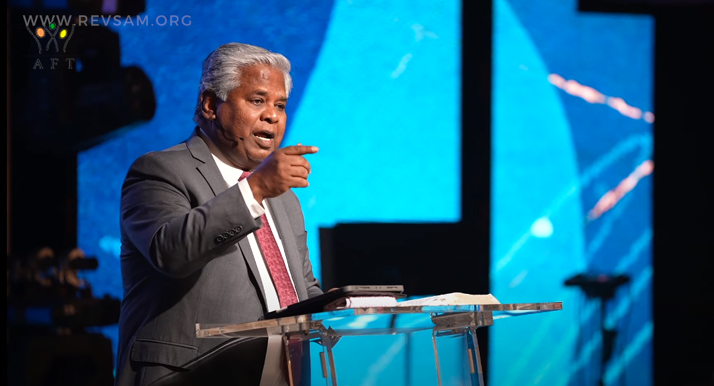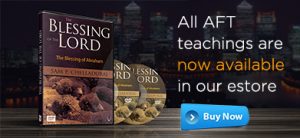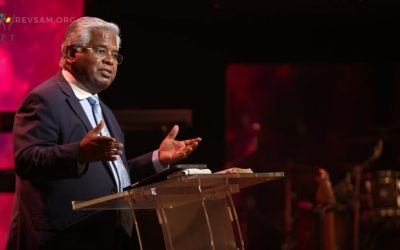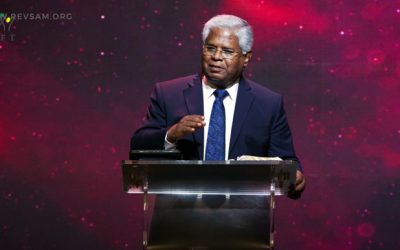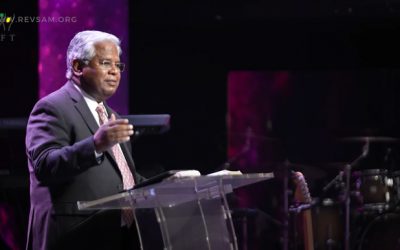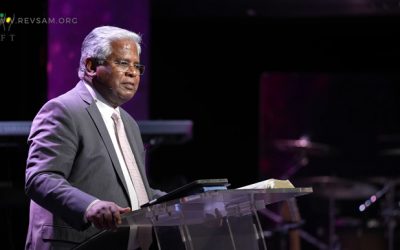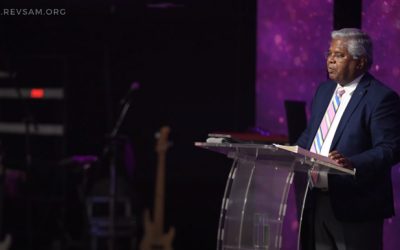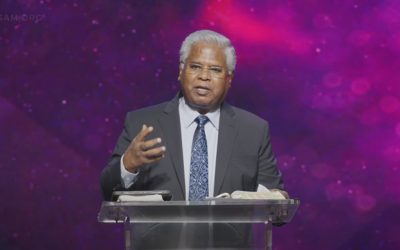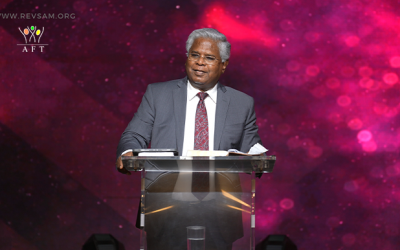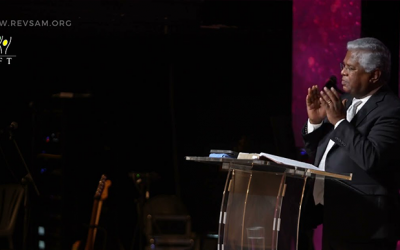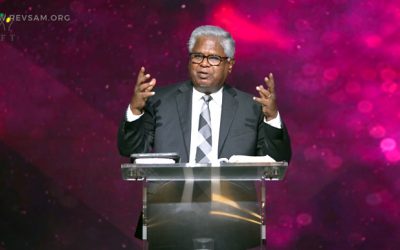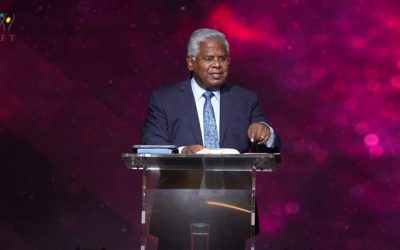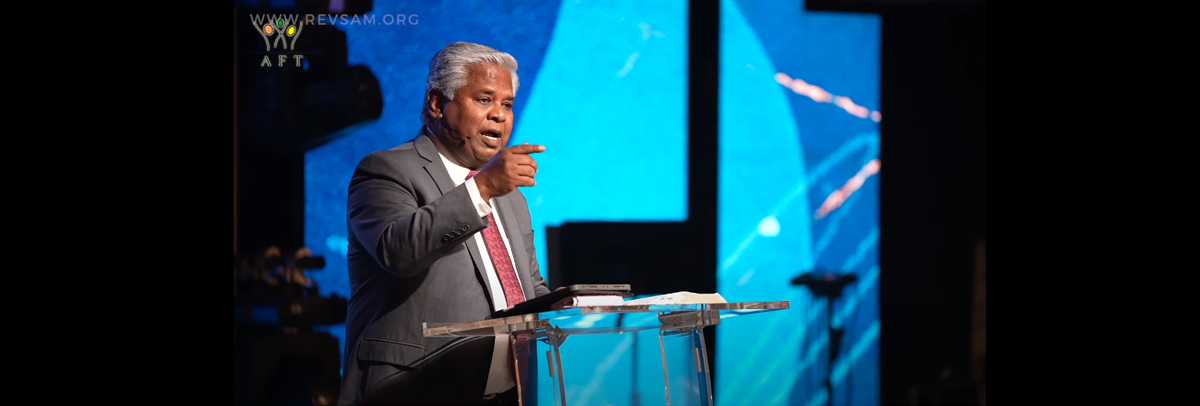
Redeemed from the Sickness: Passover Lamb
Sunday English Service – 13 MAR 22
Transcript
This is a Communion Sunday, as you know. We’re going to partake in the Communion but we’re going to do a slightly differently this week, just for this week alone. We’re going to do it at the end of the preaching because I’m going to say a few things about the subject, now preaching, it will be more meaningful if we take it at the end of the service. So, if you’ve collected your bread and the wine and all that, please keep it and wait until the sermon is over, then we’ll partake of the Communion.
Four weeks ago, we began to teach on a subject that we titled as “Redeemed” and two weeks ago, I began to teach on “Redeemed from Sickness.” We’ve been addressing this great question of; did Jesus redeem us from our diseases when He atoned for our sins? Is there anything in the atonement that Christ made for us? Is there anything there for our bodily healing? The wonderful truth is that there are many pictures of redemption given in the Old Testament because God, before He created the world and before He created man, planned for the redemption of man, that’s why Jesus called the “Lamb slain before the foundation of the world.” Since God had planned this in eternity past, after He created the world and man, He started revealing His plan, the plan of redemption throughout the history of mankind. In the Bible, it’s the grand story of redemption. The revelation of God concerning redemption is there, from the very first pages of the Bible. God has always known what He’s going to do concerning man’s redemption. He knew that he was going to sin, therefore He has prepared a Redeemer and had planned in detail, how He’s going to save the world – the Cross of Calvary, the Saviour’s death on the Cross, Him becoming a sacrifice for us. All of this was planned in eternity past. So, God kept revealing these things at various occasions and we have the record of it, throughout the Old Testament and then, we have the reality of it in the New Testament. That’s the way the Bible is organized.
So, last week, we looked at the coat of skin that God made for Adam and Eve, when He came and saw them and talked to them about what their sin had done to them. The Garden of Eden, Adam and Eve had fallen into sin; they were hiding, not able to face God. God comes and calls them out, speaks to them and in the end, He makes a coat of skin and that coat of skin is a wonderful picture of redemption. There are many pictures like that in the Bible. I want to go through some of the pictures in the weeks to come. Because some of the pictures very clearly cover the fact that there is something in redemption for our bodily healing. Those kinds of pictures, I want to deal with. And in the coat of skin itself, there is something about the body and what God has done for the body because when man sinned several things happened. The first thing that happened is, man got cut off from God. The fellowship with God, his union with God was gone. It’s like we have electricity today because we are plugged to the source. The city power department runs their wires here and we are plugged into it. Suppose they unplugged it; we’d lose the light, we’d lose the air conditioning, everything. It will become dark; it will become very hot. Adam’s life became like that when he sinned, the very moment he sinned, he got unplugged from God, the source of life and light. And his life became a life of darkness. A terrible life. That is what happened first, and it also had other results.
The other results are now that he’s ashamed. There is a shame attached. He feels that they’re naked and they’re ashamed. So, in the body, something has happened; in their soul, they feel the shame. Shame has become a factor in life. Before, there was no shame, which is why they were hiding. Before that they were fellowshipping with God, “in the cool of the day,” the Bible says. But now, they’re running from God, hiding from God and God had to call him out and ask what happened. Once God made him tell what happened, then God speaks to Adam and Eve about what the result is going to be. When you read chapter 3, verse 16 onwards, you can see that the results of sin in man is going to be in all areas of his life. It’s going to cover not only his spirit, when he gets disconnected from God, but it’s also going to cover his mind, his emotions, his body, his work of his hand, everything, it’s going to cover because he tells the woman, “You’re going to have increased pain in childbirth.” Then He tells her, you’re going to desire your husband but he’s going to dominate you. He says that. There’s going to be an unequal relationship. There’s going to be a competitive relationship, instead of a complementary relationship, where one complements the other, makes up for the other’s weakness. It’s going to be a competitive relationship. The marriage relationship is going to be messed up, in other words. So, pain in childbirth, extreme pain in childbirth. Relationship becoming competitive, therefore, become complex, and difficult and resulting sometimes in separation and divorce and so on.
And then, talks to the man and says, “Because you’ve done this thing, the earth shall bring forth thorns and thistles and all your life, you’re going to eat from the sweat of your brow. You’re going to sweat it out.” Work was never intended for man to really sweat and eat. Work was supposed to be for man’s enjoyment, to give him a sense of fulfilment and happiness. But work was now going to be tough because thorns and thistles which never grew in the garden before, now, it’s going to grow and it’s going to choke whatever he’s trying to grow. So, thorns and thistles are going to come up, work is going to be difficult. It’s going to affect his earnings and he’s going to have a tough time. And then, he’s told about his death, since he came from the dust, he’s going to return to the dust and so on. After telling all of that, God doesn’t leave them like that. He does one very important thing and that is, He makes them a coat of skin. That comes at the end of the third chapter.
So, the very first pages, it says that God gives a revelation, a picture of the redemption that is to come. That is what we talked about last week. And then, that picture, what happens is, God must have killed one animal or several animals in order to make coats of skin for Adam and Eve. So, right there, the Gospel is revealed. Man has sinned, there cannot be a remedy for what sin has brought about in his life, without the loss of the life of an innocent one. An animal who has never done anything must die, give its life, shed its blood in order to provide for the covering of man, for the remedy of man’s sin and what it has done to him. An animal has to die, an animal that has never sinned, never done anything wrong, has to die and experience something like that.
So, the Gospel is presented right there, but I can imagine how God took the skin out of the animal and then, with that skin, clothed Adam, and Eve. You could see them clothed with the skin of that animal. I can see that they’re drenched in blood because that skin came from the animal. And Adam and Eve wore clothes, now of skin and drenched in blood. Here they are, blood-washed, blood-bought – whatever terms you want to use from the Bible. All of that is realized there. They have the blood-bought, blood-redeemed, redeemed people now, they are. The picture of redemption is given there. Something has been done about their shame; something has been done about their nakedness. Something has been done to enable them to come and stand before God. They were hiding because they were naked. Now, with a coat of skin, they can stand before God. So, the problem is solved on many levels, not only their relationship with God. They’re able to come and stand before God now again. It is kind of restored, but the shame also, is taken care of. The nakedness of the body is covered. So, there is something for the body also. There is a slight picture there; there is an unveiling of the redemption, showing that redemption covers not only our relationship with God, the spiritual side of our life, but it also covers the soul aspect of our life from where the shame comes, the mental, emotional aspect of our life, as well as our bodily aspect. Everything is covered in redemption. That’s what I’m trying to say. This is what we saw last week. Today, I want to see about the Passover Lamb, which is another beautiful picture of redemption.
Now, before I get into that, let me just say a word about the importance of the types of redemption or importance of the pictures of redemption that are given in the Old Testament, and why we need to study them. See, when Jesus met with the disciples on the road to Emmaus, remember, after His resurrection, He meets two of the disciples as they were walking down, going to Emmaus. He joins them and they don’t realize that it is Jesus. And you read about that in Luke, chapter 24 and let me read to you from verse 25. See, Jesus is enquiring with them what happened. What are you talking about? What are you thinking about? They’re sharing with Him how, in Jerusalem, this Prophet was there and He was doing mighty miracles and signs and wonders and they thought it was He who was supposed to redeem Israel. But it so happened that they took Him and killed Him and He died on a cross. And they say that this morning we found out through some women that went to the grave that He’s not there. They said that He is risen, but they have not seen Him. They were told that He is risen. So, they’re puzzled about the whole thing. They thought He was supposed to be the Redeemer but how did the Redeemer die? Why did the Redeemer die? How can He be a Redeemer? And Jesus says to them, look at verse 25: Then He said to them, “O foolish ones, and slow of heart to believe in all that the prophets have spoken! Ought not the Christ to have suffered these things and to enter into His glory?” And beginning at Moses and all the Prophets, He expounded to them in all the Scriptures the things concerning Himself.
Jesus is saying, “Hey! You are dull of heart, slow of heart, to believe all that the prophets have spoken in the past.” That is, He is referring to the Old Testament. He means to say, “Don’t you understand the Old Testament? Have you read the Old Testament? Do you see what the Old Testament is saying?” The Old Testament is saying that Christ must suffer first. The Messiah must first be the suffering Messiah then only, He must enter into glory. This is the thing that puzzled the Jews. They never understood that Christ suffered first. Somehow, they thought that Messiah is going to come in a grand way, on a horse with a sword, and He’s going to do with all the enemies and He’s going to put down the Roman Empire and deliver them from the subjugation through the Roman Empire and set them free and rule over everyone and so on. They were expecting a grand entry by the Messiah, and glorious victory and triumph and domination of the Messiah in the world. That’s the kind of Messiah they were expecting.
But the Messiah, the Bible talks about is different. That’s why Jesus says, “You read the Old Testament; you didn’t understand the Old Testament. That is why you’re afraid, you’re troubled today.” You’re confused about the death of Jesus. You’re afraid and troubled because you never understood the Old Testament. “You’re slow of heart.” You don’t understand what the Old Testament is saying. Old Testament is all the time saying that the Messiah must suffer and die. Actually, He says, “Ought not the Christ to have suffered these things.” He’s referring to the Cross and the terrible death that Jesus experienced there on the Cross. He says, ‘He suffered these things.” Suffering Messiah is the thing that the Bible talks about in the Old Testament, Isaiah 53, and all the sacrifices and offerings of the Old Testament and so many pictures are there that speaks about the Suffering Messiah.
This is the problem of the Jews; they never understood it, that is why they never understood Jesus and His death on the Cross. That is why the Jews hated Paul and wherever he went, he was beaten, thrown in prison, troubled, persecuted, hated, and so on. Why? Because their question is, how can you worship this Man as God? How can you worship this Person as the Messiah? How can you think that He is the Messiah? He died on a Cross, on a tree: “Cursed is everyone that hangeth on a tree,” the Old Testament says. He’s a cursed person. How can you call Him the Messiah? They did not understand that He took their curse and died and that is why He became cursed. It was their curse with which He was cursed and He died there on the Cross for that. They did not see that picture at all; they did not understand it. That is why “beginning at Moses,” it says—Moses is a reference to the first five books of the Bible and all the prophets, which is the rest of the Old Testament. Moses and all the prophets are a reference to the Old Testament, generally. He expounded to them in all the Scriptures that thing concerning Himself; Jesus expounded to them. Paul’s preaching was basically that kind of preaching. You read about Paul preaching in places like Ephesus, morning and evening, every day, for so many months. He is preaching years; he’s preaching. What would he have preached? He had only the Old Testament. What did he preach? He was preaching to them saying that this is the Christ; this is the Anointed One that was supposed to come. They were thinking that He would come and just deliver them and have glorious victories, but he is saying that He would come and suffer first and then only be glorified. Taking the Scriptures from the Old Testament is what he was doing. In other words, Jesus, in teaching the disciples, going to Amos, as well as Paul, teaching in the New Testament times, but doing exactly what we’re doing today, going through the Old Testament, showing that this is the Christ, that He must suffer first and die, then only He must be glorified. And why did He die? Why did He suffer? What do we get from His suffering? What has happened as a result? This is the teaching that was New Testament teaching. This is the teaching that went on back in those days.
See, to understand that Jesus came and lived and dies, you don’t really need the Bible. Other evidence is there that such a person as Jesus came and lived and died in Jerusalem at such a time and so on. Historic facts are there but we need the Old Testament and without the Old Testament, we cannot understand the reason why He died. If you want to understand the reason why He died, you cannot go to the Old Testament. There are other books telling you that Jesus was a Person who was born in Bethlehem, raised up in Nazareth, lived and did these miracles and what He taught and all of that is recorded in history and what happened to Him in His death is recorded in history. The event of His death is recorded in history. The meaning and the significance and the reason for His death and what comes to us as a result of that, is something that we can learn only through the Old Testament pictures and the New Testament teaching of the Epistles. And that is why we are going through this.
So, let’s look at the Passover Lamb. Turn with me to Exodus, chapter 12. Exodus, chapter 12 is where we have the first Passover. Remember, the children of Israel are the great grandchildren of Abraham. Jacob was the grandson of Abraham and his children. During their days, they went to Egypt. They went seeking some grain during times of famine, and God prepared the way for them by taking Joseph ahead of them there. By some unfortunate course of events that happened in his life, God turned it into something good and elevated Joseph to a place of great authority and power in Egypt, so that when Jacob’s family who thought that Joseph was now dead, went seeking for grain in Egypt, they found that Joseph was indeed alive. And that he was the head of the whole country of Egypt and that he invited them to bring their father and their entire family and 70 of them went and settled there in Egypt at that time. They had tremendous favour with Pharaoh. They were given a separate portion of the country, Goshen, to occupy, were taken care of so well, treated so well. They enjoyed their stay there but after that Pharoah was gone, after Joseph, people forgot the value of Joseph and what he had done in saving their country from famine and elevating their country to such a level. The role that Joseph played was forgotten. The favour was withdrawn. Trouble started coming their way and then, ultimately, they were enslaved by Egyptians who were jealous of them and their progress and they were put through a lot of trouble in Egypt, ended up as slaves in Egypt.
Now, if you read books that tell us about life in those days; if read the details, the gory details of the life of people in those days, were slaves. You know, you’d think that even animals live better. That’s how they treated people. It was a very difficult time for people in general, back in those days. And they cried out to God. See, they had forgotten God. When they moved there and they lived in great comfort and so on, after a while, they forgot God Who had made all this happen to them. And they started worshipping whatever they were worshipping and so on and going their way and got into big trouble, became enslaved and went through a lot of trouble and they cried out to God. The Bible says that God comes to them and tells them through Moses, that he heard their cry and has come down to save them. So, they cried out to God and God was merciful and took them out of Egypt. He prepared a man named Moses to take them out of Egypt, and had Moses grow up in Pharaoh’s house itself. Pharaoh was killing all male children trying to, you know, destroy the entire Jewish race. All male children were supposed to be killed when Moses was born. The order was given by the king. And at that time, somehow, God takes Moses and put him in Pharaoh’s house, in the palace, to live there and to grow up there. The way the Bible says that he was learned in all the wisdom of Egypt, he must have had some higher education. He had good upbringing; he was raised up with all the good things that Pharaoh’s household can provide and Pharaoh’s privilege status can provide. God was raising up a man, highly educated, and skilled and able, and so on, to do something for him.
Now, I like our God and the way He operates. When you think He’s not working at all, and that He has forgotten you, He’s working in the back. That’s what He was doing in Moses’ days. God was plotting to bring Pharaoh down. Pharoah thought he was in power but God was raising Moses up and when Moses went and told Pharaoh, “Let my people go!” Pharoah said, “What do you mean?” Moses said, “Well, we want to worship our God and our God has told us to go and so on.” And Pharoah said, “Who is your God? I don’t know your God. Who is your God? What can He do to me?” And God showed him who He is by all the plagues that were sent. And finally, the final plague that was going to be sent was going to be really serious. From Pharoah’s house to the ordinary person’s household, in every house, there is going to be death of the firstborn, both human beings as well as animals. God marked the day and said that there’s going to be the death of the firstborn.
I remember, in the days when I was studying, they said that there is a list of all the pharaohs that ruled, one after the other. And you can see this particular pharaoh that ruled when Moses delivered the people of Israel, from Egypt. And in that list of all the pharaohs that ruled, it usually goes that so and so ruled and after that, his son, and so on. That’s the way the list is given. But the pharaoh that ruled when Moses delivered the children Israel, after him, his son did not rule. Someone else came into power because what God has said has happened in Pharaoh’s house itself, that his firstborn was also dead. Now, this is something that happened as a result of God’s judgment. In Exodus, chapter 12, we read about it. God told Moses to go and prepare the people and tell them to do certain things in order to protect themselves from this death. That was going to be the day of their deliverance. So, God tells them this in chapter 12—I don’t want to read all the verses; you need to read from verse one, actually, but let me tell it to you in short—God tell them to take a lamb, for every house. One household; one lamb. And that lamb has to be a spotless lamb and they must kill it at twilight, verse 6 at the end says.
And verse 7 and 8 is what we’re going to read: And they shall take some of the blood and put it on the two doorposts and on the lintel of the houses where they eat it. Then they shall eat the flesh on that night; roasted in fire, with unleavened bread and with bitter herbs they shall eat it. They were supposed to do two things to this lamb after they killed it. They needed take the blood of that lamb and apply it to the doorposts and all the lintels – the entryway into the house. The lintel is on the top; the doorposts on the two sides. They must smear it with the blood of the lamb. Not only that. They must eat the flesh, roasted in fire. And it’s also told us how they should eat. Eating is given a lot of attention, just like smearing the blood. God is very specific about how the blood must be smeared. Eating also, very specific instructions are given. Look at verse 11: And thus, you shall eat it: with a belt on your waist, your sandals on your feet, and your staff in your hand. So, you shall eat it in haste. It is the Lord’s Passover. So, they must eat the lamb and they must eat the lamb in such a way that they’re dressed, ready with their staff, ready with their shoes on. Everything ready, ready to depart from there, ready to take off.
Now, just imagine if you and I were people of Israel in that day and we heard this instruction from Moses. I believe there must have been a lot of discussion. For 400 years, they’ve been trying to go out. They have been denied permission to leave the country. Just imagine. In our times, if you’re denied permission to leave the country, you have the passport, you have everything but you can’t leave the borders. You just have to stay in, you cannot go out, such a situation. They cannot leave. They’ve tried, in their grandfather’s grandfathers day, they tried, they couldn’t go. The grandfather’s father couldn’t go, grandfather couldn’t go, the father couldn’t go For generations together, they’ve tried and tried and tried. Even during Moses time and so many wonders, miracles, and signs were done by God to persuade Pharaoh to let them go but he wouldn’t let them go. For 400 years, their efforts failed. Nobody could get out. No permission to get out of the country. If you’re part of that group of people and if a man like Moses came and said, “Get ready, put on your shoes, get dressed up, take your staff, and kill a lamb, put the blood on the doorposts and sit inside the house. The Angel of Death is going to come, there’s going to be a terrible massacre. The Angel of Death is going to come, there’s going to be death in every house but if you sit inside that house, protected by the blood, you will not be touched by that death. The Angel of Death will pass over – that’s how the name, ‘Passover’ came. The Angel of Death will pass over you; you are exempt from death. Sit inside while you’re sitting inside, be dressed up, put on your shoes, get your staff read and eat in haste, eat in a hurry because you’re going to leave. I’m sure there was a lot of discussion about it but somehow in the end, after seeing all the things that happened, I think, they must have been persuaded and they decided to get ready and get ready to leave. Something terrible is going to happen. We’re going to finally let go; it’s going to happen, so they decide to eat in a hurry. Is this a picture of redemption? Is this Passover lamb, the killing of the lamb, smearing the blood on the doorposts and eating the flesh of the lamb – is all of this the picture of redemption or salvation, of the Cross? Is it a picture of the Cross and the redemptive work of Christ?
Turn with me to 1 Corinthians, chapter 5. We’ll settle that first and then proceed. 1 Corinthians, chapter 5, I’ll show you that this is the picture of our salvation. 1 Corinthians, chapter 5, the later part of the verse: For indeed Christ, our Passover, was sacrificed for us. Paul, the greatest New Testament preacher sees the Passover lamb, the killing of that lamb, shedding of the blood, smearing of the blood on the doorposts and the lintels and the eating of the flesh of the lamb, that Passover lamb – he saw Christ in that lamb. He says, “Christ in our Passover!” That Passover Lamb is a picture of Christ and what He has done on the Cross. The Cross of Calvary represents a sacrifice. The blood that was shed there was represented by the blood that was shed by the Passover lamb during Moses’s time. It is this blood that it was representing. It is the type of this blood. To preach and tell us about this redemption that God would bring about through the Cross of Calvary. God told Moses to kill that Passover lamb in the past. He says, very clearly, “Christ our Passover was sacrificed for us.” Christ is seen clearly by Paul, as the Passover Lamb. His death, shedding of blood, the eating of His flesh, is all about Christ and what He has done for us on the Cross of Calvary.
Now, someone might say, “Well, alright, I can see that. Christ is our Passover. Yeah. It’s a wonderful picture of our salvation, our forgiveness of sin, our escape from eternal death and hell. We are exempt from it. Just like they were exempt from dying. We are exempt from hell and eternal punishment because we’re blood-bought people. The blood protects us from that. We are saved. I can see that. I can see our salvation in that. But where is healing in that?” they say.
Turn with me to Psalm 105. Turn with me to Psalm 105. Where is healing in that? Is there healing in it? Turn with me to Psalm 105. Let me say this, before I read this. You see, they’ve been in Egypt for a long time, 430 years they have been there. Most of the time, they have been slaves. They were troubled by the Egyptians, enslaved, tortured, beaten and so on. They were required to produce a quarter of bricks every day. And when Moses went to the Pharoah and asked to let them go, the Pharoah decided to increase their work because he thought these guys want to go on vacation to worship their God. It seems like they have too much time on their hands. So, don’t let them even think about that. Give them a lot of work. So, the straw that is needed for making bricks also must now be gathered by the people. They were provided with a straw, they made the bricks but now, they need to gather the straw also. They must make the same number of bricks as they did before. So, they need to go out, gather the straw and come and make the same number of bricks that they made before the straw was given to them by the government. So, work has been doubled, literally and they were suffering under the load of that work. And when they didn’t work, when they couldn’t meet the demands, when they couldn’t meet the targets, they were beaten. They were treated like livestock. Just turn to Exodus, chapter 5 and we’ll come back to Psalm 105 in just a minute. Turn to Exodus, chapter 5, I just want to show you in what condition they would have been when they left. I want you to see a picture of those people and their condition when they left the land of Egypt.
So, chapter 5 and let me read you from verse 7 to 14. Exodus, chapter 5, verse 7 to 14: “You shall no longer give the people straw to make brick as before”—Pharaoh is telling them there, telling the leaders there—“Let them go and gather the straw for themselves.”—Pharaoh was telling country’s leaders to do this to the people of Israel— “And you shall lay on them the quota of bricks which they made before. You shall not reduce it. For they are idle; therefore, they cry out, saying, ‘Let us go and sacrifice to our God.’ Let more work be laid on the men, that they may labour in it, and let them not regard false words.” In other words, give them a lot of work so that they won’t have any time to go to Moses’s meeting and Aaron’s meeting and all that and hear their big preaching about how they need to go out and God is calling them out, taking them to a promised land and all that. Don’t give them any time to go and hear preaching and all of this and imagine themselves going out. They should not have any time. Give them full work so that when they come home, they’ll crash and they’ll sleep. “And the taskmasters of the people and their officers went out and spoke to the people, saying, “Thus says Pharaoh: ‘I will not give you straw. Go, get yourselves straw where you can find it; yet none of your work will be reduced.’” So, the people were scattered abroad throughout all the land of Egypt to gather stubble instead of straw. Just imagine that. Scattered all over the land, throughout the land of Egypt. These people are going miles and miles just to gather stubble to make bricks. Torture. Just imagine in what conditions they would have been.
And the taskmasters forced them to hurry, saying, “Fulfill your work, your daily quota…”—target must be met, so many bricks a day—“as when they were straw.” Also, the officers of the children of Israel, whom Pharaoh’s taskmasters had set over them, were beaten and were asked, “Why have you not fulfilled your task in making brick both yesterday and today, as before?” So, they were beaten also. Literally tortured and beaten. You can imagine the condition that people were overworked, so that they’re mentally, emotionally troubled, demeaned, looked down upon, kicked around, treated like dirt, made to work from morning till night, so that there was no time. The load of work was something that they could not bear. Just imagine the way they would have lived. They would not have had a decent place to live, food would have been substandard. They would have overworked every day, malnourished. So, that’s going to produce a whole community of people that are sick. People that are beaten, people that have broken ribs, broken hands, and limbs. There’ll be people with the eyes, noses and ears that are broken damage. They didn’t have proper medical care. Just imagine that; I want you to think about that. They say the heat would have been so severe that they will drop from heatstroke; they will just drop and fall because of heat stroke. So, you’ll have a lot of broken, sick people, deceased people, weak, damaged people because that’s what slavery would produce.
Back in those days, society was like that. They were tortured like crazy. That’s what the people would have been like – weak, emaciated, not eating much, not having a good place to live, overworked, emotionally troubled, crying inside, troubled inside, in fear, not having any peace, not having a smile on their face, not in the mood for anything good. That’s the way they would’ve been. But look at Psalm 105. The psalmist describes the day that they left Egypt and what happened on that day. Verse 36: He also destroyed all the firstborn in their land, the first of all their strength. In other words, he’s talking about God’s dealings with Israel. He’s telling how wonderfully God dealt with the people of Israel, how He delivered them from the land of Egypt and so on. So, he says, “God destroyed all the firstborn in their land. The first of all their strength. He also brought them out with silver and gold, and there was none feeble among His tribes.” Now, this is something unbelievable! “None feeble among His tribes.” That’s why I told you what I told you just a few minutes ago. You can imagine the people, overworked, having food that’s very poor quality, having dwelling places that are no good. They probably slept in cold and worked in heat. Ate less than a normal person should eat. Beaten, troubled, afraid, literally torn apart in every way, when they came out. It describes them as coming out with gold and silver. Then it says that there was none feeble among His tribes. He brought them out with gold and silver and there was no feeble person among the tribes. This is very interesting.
Now, if you read the book of Exodus, it tells us that there were six lakhs of foot soldiers among the people of Israel. That is men, strong, abled men, six lakhs, 600,000 men. This is not counting the older men and the women and children. Older men, women, and children were not counted. Six lakhs, abled men. Counting from that, they calculate that there must have been at least two to 3 million people, which is 20 to 30 lakhs of people, the people of Israel. Are you going to tell me that among the two to three lakhs, 3 million people, there was not one that was feeble, not one was sick? Now, you take any household, where there are 10 people, there’ll be somebody sick, you know. Somebody will be sick if you are 10 people. If you take a crowd of 50 people or 100 people, several people will be sick there. Here it is saying that out of the two to 3 million people that were there, when they left, they all left with gold and silver because God told them to go and ask from the neighbours for gold and silver, and they were happy to give, surprisingly, because they knew that in every house, there’s going to be death. They were told, “Hey, you’re going to die.” So, they said, “Please leave. Please leave.” They said, “Give me your gold and silver.” And they gave their gold and silver. I know some of you are thinking, my God, what kind of God is this God? God of daylight robbery. No? God of justice is what I would say. For nearly 400 years, their salary has been denied to them. Heaven has been keeping perfect account of every penny that was due to them. Now, in one night, God was going to collect everything, all the arrears with interest and penalty.
See, God is a God of justice. Do you think God is not doing? Where is God? Why hasn’t He seen me? What has God done? Well, God is working out a plan. God is working there in the back. Usually, God is a great planner, great executor of the plan. When He executes, you will be astonished. In one night, God collected all the dues. Everything owed to their grandfather’s grandfathers days and collected it and gave it to them. These people that had nothing, not even a good place to sleep, not good food to eat, people that are sickly, afraid, emaciated, poor, came out with golden silver. Just imagine! They were loading up gold and silver when they came out. God knows what they needed. When they went out, they’re supposed to go live for God in the Promised Land. So, God knew that they needed money. Secondly, they needed to be in good health. If you want to do anything for God, want to live for God, you need these two things. That’s why I can’t understand people. Like one fella said, “Myself and my wife and my two children, we have a nice house, we have a little car. God has blessed us. Thank God.” What are you thanking God for? Blessing you and your wife and your children and that’s it? That’s all life is all about. That’s so short-sighted, so narrow-minded. They think if they had everything, that’s blessed life, but the Bible doesn’t say it like that. The Bible says, “I’ll bless you and make you a blessing.” Until you become a blessing to others, you’re not even starting to live, my friend!
The reason God wants you to have much more than what you need to have… Some Christians are like that; they have very strange ideas. He said, “After all, brother, how much does a person need?” Have you heard talks like that? One preacher actually came to me and said, “How much does one person need?” Don’t you think we should not have anything more than what one person needs? I said, “Brother, we don’t have to struggle trying to calculate how much one person needs. Government has already calculated. They’re giving 10 kilo rice, so many kilos of sugar, so much kerosene, so much dhal, so masala also. You should go collect that and shut your mouth and just live satisfied because you don’t need anything more than that. What you need, they’ve perfectly calculated with all their expertise. They know. In fact, some time ago, I think, government said, everyday people need, what they need is like some 5-6 rupees or something like that. It’s laughable. Maybe 20-30 rupees, I don’t know what it is. It’s some unbelievable figure. You can’t even eat anything with that. That’s all one person needs, they decided. Thank God we don’t have to live on that. What one person needs is so worried that people have much more than what they need. He doesn’t see the point of having much more than what you need. But I believe in having much more than what you need because how can you be a blessing to others if you don’t have much more than what do you need?
So, God knew and when God gave, He gave much more than what they need. He gave them and blessed them like that. He blessed Abraham like that, Isaac like that, Jacob like that, Joseph like that. He blessed the people of Israel now like that, with gold and silver because they needed to go out and be a blessing before the world, be a witness before the world, shine before the world and live before the world. God knew what they needed. They needed good health also. I’m going to come to that later on. Redeemed from sickness is what we’re teaching on. I’m going to come to redeemed from poverty also. That’s a very important subject also. Now, let’s get back to the sickness business. They had 2-3 million people; you can’t tell me that nobody was weak among them, that everybody was doing so well.
Now, you can imagine, today, again, imagine yourself being the people of Israel and I’m Moses, just for a few minutes. I’m telling you, “Put your shoes on, get dressed, get your staff, get ready. We’re going to cross the Red Sea. We’re going to go; we’re going to be delivered. We’re all slaves in Egypt but I’m saying we’re going to be set free. Let’s go! Do you know what some of you will say? As soon as they get down, you’ll crowd around me and say, “What about my father, brother? He’s very old; he cannot even walk. I have an uncle who had a stroke; he’s bedridden. I have one aunty who’s leg is broken; she cannot walk. How are you going to take them?” Imagine how many people in those families of slaves, people made up of slaves, beaten, abused, would have had all kinds of limbs, bones broken all over their body? How many would have been in bad shape, physically, unable to travel, not in a shape to travel, make the long-distance travel at all. How many would have been there? I think there must have been 1000s and 1000s of them that can’t even get up to get dressed, leave alone, to put on their shoes. They’re not in a shape to even get dressed. How does the Bible say then that was not one among them that was feeble? I’ll tell you how. That is why God not only told them to shed the blood and put the blood on the lintels and the doorposts but He also told them to sit and eat that flesh in haste, in hurry because they’ve got in travel. When they took the flesh of the Passover lamb that represented Christ, when they took it and ate it, a supernatural divine healing came upon them. Strength came upon them. Power came upon them. Their health was restored. People that never walked, walked; people that never stood up, stood up. People that never had strength, now had strength. They were delivered, set free, and healed! That’s the only way they could have gotten out of there. There’s no other way. There’s no other way. That is why, in the New Testament, we read. See, this is before the Cross, the picture of the Cross of Christ. His bloodshed, His body broken. In the New Testament, after Jesus came and died on the Cross, even when Jesus was there before His death, He gathered the disciples, one day, on a Passover day and He took the bread and He broke it and said, “This is My body, broken for you.” And took the wine and gave them and said, “This is the blood of the New Covenant,” He said. He showed them how the Passover represented Him and what He is supposed to do on the Cross of Calvary, even before He died on the Cross. He himself talks about the Passover Lamb as representing Him.
William Barclay, a great teacher of the Bible, back in the old days, he’s very backgrounds, you know. He says that in Jerusalem, 2 million people gathered for every Passover. If you calculate 10 people to a household, they killed, he says, 200,000 lambs on a Passover day. The killing of 2000 Passover lambs, he says that roads of Jerusalem ran with blood like rivers, running on their roads. And it is on one such occasion, he saw Jesus going by and he said, “Behold, the Lamb of God that taketh away the sin of the world.” In other words, he’s saying, 200,000 lambs killed, blood running like river all through the streets of Jerusalem but this blood is not going to save you. All the lambs dying cannot save you; they’re not the Saviour. They’re all to point to this One Lamb, the Lamb of God, the Saviour, Jesus Christ. He is the Lamb of God. He calls Jesus the Lamb of God. “The Lamb of God that taketh away the sin of the world,” he says. And after Jesus rose again, the church started and Paul started preaching. Paul gives the institution of Communion to the church, commands the church to observe Communion, and this is what he has to say. Listen to what he says. In chapter 11, of 1 Corinthians and verse 23. He says, “For I received from the Lord that which I also delivered to you.” In other words, he says, I learned it from Jesus, the thing that I’m telling you now about Communion. I received it from Jesus Himself, that the Lord Jesus on the same night in which He was betrayed took bread; and when He had given thanks, He broke it and said, “Take, eat; this is My body which is broken for you.” In Tamil, it’s said beautifully [Tamil] That means, My body which is tore up for you, My body that was torn up for you. And likewise, He says, “In the same manner He also took the cup after supper, saying, “This cup is the new covenant in My blood. This do, as often as you drink it, in remembrance of Me.” Very clearly. See, Passover was before Christ’s Cross, before the Cross happened. It was to be a picture of the Cross and what was supposed to happen on the Cross. It portrayed the redemption, and what redemption involved and what redemption did.
Now, when Jesus was there, He Himself mentioned that, that that’s what it’s portraying. John the Baptist called Jesus, the Lamb of God, but after all of this has happened on the Cross, when Passover Lamb was fulfilled, the type got fulfilled on the Cross of Calvary, all preachers and he now says, “The church must observe this.” In the old days, they observed Passover. Every year they were supposed to observe Passover. It started in the Exodus, chapter 12 but every year, the people of Israel were told to observe Passover on a particular day, on a set day. And now, after Jesus has suffered on the Cross, and raised from the dead and so on. Now, we are told to have something like this called, ‘Communion’, which represents exactly what the Passover represented, which represents the Christ who died for us on the Cross of Calvary and what He has done through His death. We’re supposed to observe it as often as we can, so that we do it in remembrance of Him. It says, “Do it in remembrance of me.” Verse 26, says, “For as often as you eat this bread and drink this cup, you proclaim the Lord’s death till He comes”. Now, we are told to observe it, so that we never forget, so that we always keep what the blood of Jesus has done and what the body of Jesus, broken for us, has done for us, before our eyes, that we will never forget what has been achieved through it. That it will never be before our eyes, that we will practice it, we will do it and every time we do it, we will remember His death.
Then, He says in verse 27, “Therefore whoever eats this bread or drinks this cup of the Lord in an unworthy manner will be guilty of the body and blood of the Lord. But let a man examine himself, and so let him eat of the bread and drink of the cup.” Now, listen to verse 29: “For he who eats and drinks in an unworthy manner eats and drinks judgment to himself, not discerning the Lord’s body. For this reason, many are weak and sick among you, and many sleep.” The Weymouth Translation, a wonderful translation of the New Testament, translates verse 29 to 30, like this: For anyone who eats and drinks, eats and drinks judgement to himself, if he fails to estimate the body aright. If anybody fails to estimate the body of Jesus. See, this is the thing. A lot of preaching is about the shed blood and how the blood must be applied. A lot of things are said about that, that’s heard, but hardly anything is said about the body because we have not taken the time to estimate what the body is all about. What the eating of the flesh of the Lamb means. He says, “If you fail to estimate the body aright, that is why many people are sick and they are weakly,” he says. “And some are even dead,” he says. The Lord’s Supper is more than an ordinance. Why? Because when you partake in the Lord’s Supper, you partake of Christ, while you’re partaking of the bread and the wine. You’re literally partaking of Christ. It is like the people of Israel who sat there and ate that flesh. It is literally like that. It is just like they received strength, that you receive your strength, your health, and your healing. In Christ, there is both bodily life and spiritual life. And surely, there is no better time to avail ourselves of the life of Jesus, made manifest is our mortal flesh, than when we observe Communion. It is a time in which we can avail ourselves of the life of Jesus.
In the Old Testament, there is a tremendous story in 2nd Chronicles, chapter 30, verse 20. 2nd Chronicles; I’ll just read that and we’ll close. 2nd Chronicles, chapter 30, and verse 20: And the Lord listened to Hezekiah and healed the people. This is talking about how they observed Passover, after a break of 765 years. See, God told them to observe the Passover every year, but somewhere something wrong happened. They forgot, they failed, in the matter of observing the Passover. I don’t know if they completely failed in observing the Passover or if they did not observe the Passover in the way they should have observed. Some scholars say they did not observe it the way they should have observed; some say they failed to observe but nevertheless, after 765 years and after this king. See, from the days of Judges, they have not observed Passover. Centuries, they’ve neglected this thing and all of a sudden, there is a reform that is made by this king and one of the reforms that he made was that he brought back Passover observance. 765 years later, Passover observance was brought back, they began to observe it properly, at least, and when they observed it properly, the Bible says, “And the Lord listened to Hezekiah and healed the people”. Passover is just a picture of the Cross of Christ, the Lamb of God. In observing that, 765 years later, God healed the people.
Today, Jesus who’s represented by the Passover Lamb has come and died on the Cross and completed His work of salvation. Today, when we observe Communion, we take part of the Communion. Don’t you think we ought to be healed? Amen. Don’t you think it is our time to receive healing, our healing? I believe that every time we take Communion, we need to think about that. Every day, in fact, we need to think about that, that His body was broken for us, tore up for us. His body became like a ploughed field. “By His stripes, we are healed,” the Bible says. And every day, we need to claim that, when you’re sick, when you’re weak, when you feel like sickness is coming over you, you need to say, “I’m healed by the stripes of Jesus. His body was broken for me. In the name of Jesus, I am healed. He took on Himself, my weaknesses and He bore my sicknesses. Therefore, I am healed.” Amen.
Alright, let’s get ready to take Communion, right now. I hope everybody’s got it. Let’s pray and partake of the Communion.
Redemption of Our Culture (Part 2)
Redemption of Our Culture...
Redemption of Our Culture
Redemption of Our...
Glorification: Redemption of our Body
Glorification: Redemption of...
The Redemption of Creation
The Redemption of...
What Redemption Accomplished?
What Redemption...
The Three Mega Changes of the New Creation
The Three Mega Changes of...
Devastating consequences of man’s sin
Devastating consequences of...
Jesus: The perfect picture of man, as God made him
Jesus: The perfect picture...
The Ruin of Humanity (Part 2)
The Ruin of Humanity (Part...
The Ruin of Humanity
The Ruin of HumanitySunday...


